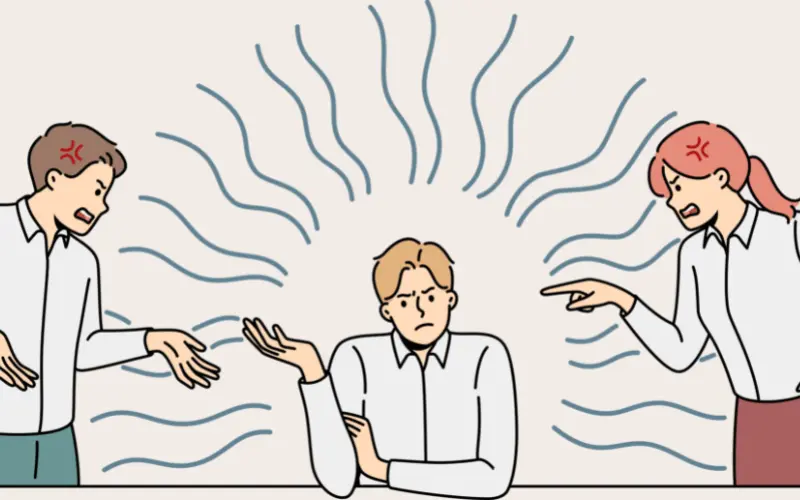Most of us have intrusive thoughts some time or the other. However, when these kinds of unwanted thoughts become a constant part of our thinking pattern, then they can lead to various mental health issues, such as anxiety, depression, and more.
What Is Cognitive Defusion?
Cognitive defusion techniques are an effective aspect that gets used in Acceptance and Commitment Therapy. According to this, one can learn the skills to distance themselves from negative and unwanted thoughts, emotions, and feelings. It’s like you look at your thoughts rather than through your thoughts.
As famously said, “you cannot stop the waves, but you can learn to surf.” Similarly, the more you try to fight with your thoughts, the more drained you get. It’s better to accept them and make your way by detaching from them.
As we all know, not all our thoughts are true. Despite knowing that, we easily buy our thoughts and start getting upset and anxious about them. But, if we try to calmly sit with them and let them pass without paying much heed to them, your cognition process will get enhanced and how.
What Do You Mean By Defusion?
The word “Defusion” means to separate yourself from your thoughts. Because of mental health issues like, generalized anxiety disorder, obsessive and compulsive disorder, and depression, the tendency of negative thoughts get increased in our brain cognition, leading us to more degraded emotional health.
With the help of cognitive defusion techniques, one can learn to manage their intrusive thinking patterns and enhance their psychological health to altogether different levels.
Let’s now read about some cognitive defusion techniques!
What Are Some Of The Effective Cognitive Defusion Techniques?
Here are some of the most commonly used and recommend cognitive defusion techniques-
Add “I notice that I am having a thought of” in front of your thoughts-
I know it may sound frivolous if you are reading about cognitive defusion techniques for the very first time. But, according to studies, it works. With anxiety and depression mood disorders, our thinking becomes very negative. We somehow become critical of ourselves and even of our surroundings.
We start thinking that it is going to be like this forever. Our thinking will dominate us forever. And we cannot do anything but escape through happy and meaningful moments of our lives.
In reality, you can change the way you think, and even how you cope with your intrusive thoughts. Of course, it will happen over time with practice, not over night. With this cognitive defusion, you have to add “I notice that I am having a thought of” in front of your thought. By practicing this regularly, you will develop a sense of detachment and distance from your thoughts and emotions, becoming successfully able to process your feelings.
Make silly and weird sounds, reciting your thoughts repeatedly-
Yes! You have heard it absolutely right! With constant negative thoughts and brain words, one can start panicking and limiting itself.
The nature of intrusive thoughts can be very random and sudden. For example, after months of locking yourself at home, you have today decided to visit your friend, then suddenly at the time when you were just about to step out of your home, you start worrying about how you are looking, and what your friend will say, and blah blah blah…
It can seem like you can conquer your intrusive thoughts but eventually lose your battle to your thoughts. So, at that time, despite fighting against your thoughts, you can make silly and weird sounds, repeating your thoughts.
For example, if your thoughts are that I am a loser. Start reciting it in a weird sound- I am a loser! I am a loser! After doing this for a while, you will feel a sense of separation between you and your thoughts, processing cognitive defusion.
Also Read: What Are Cognitive Distortions And How It Affects Your Life?
Thank your mind for creating worrisome and intrusive thoughts-
I know it can sound very weird. But, it is one of the crucial defusion methods. What happens is when we have been living under chronic stress or trauma for years, our mind’s flight or fight response gets triggered, leading to more and more anxiety and distress.
At that time, our thinking pattern becomes heavily biased towards negative information, imagination, and visualization. So, for example, if your mind is constantly saying to you something wrong is going to happen. But you have the awareness to differentiate that it’s just your flight and fight response playing games with you. So you can thank your mind for the alertness.
It works like magical and breaks the loop of constant anxious thoughts and bodily sensations. By doing this regularly, you can shift your cognition, eventually creating more positive thinking patterns.
These were some of the cognitive defusion techniques. By making them a daily part of your life, you can reduce your anxiety levels to a greater extent. However, it’s always best to first meet a professional therapist and accordingly work on your mental health.
Of course, these ACT methods can be used by anyone. They won’t do anything wrong, but with the help of a professional, you can understand and practice them better and reap great benefits in the long run.
What Are Advantages of Cognitive Defusion For Mental Health?
-Help us understand the negative biases of our thinking.
-Change our intrusive thoughts and patterns, slowly but gradually.
– Reduces our anxiety levels and enhances our mental health.
-Help us shift our inner deeply rooted belief system and way of being.
-Encourages you to ask realistic questions to yourself-” Is this thought helpful to me or causing me harm”, “Am I being realistic thinking this way or is it all false thinking”, and more.
These are some of the great advantages one can get by following cognitive defusion in their day to day life.
So, this was about the cognitive defusion techniques and the benefits one can get from them.
I hope you like this blog post. Feel free to share your opinions and experiences about different facets of Acceptance and Commitment therapy. Would love to know from you!











